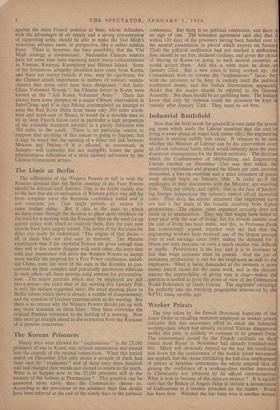The Limit at Berlin
The willingness of the Western Powers to fall in with the Russian demand that the Berlin meeting of the Four Powers should be delayed until January 25th, is no doubt mainly due to the fact that the co-ordination of Western policy was still far from complete when the Bermuda conference ended and is not complete yet. That might provide an excuse for some further delay. But if this is the pass to which we have come through the decision to place more emphasis on the need for a meeting with the Russians than on the need for an agreed policy with which to confront them, then the past nine months have been largely wasted. The desire of the Russians for delay can easily be understood. The origins of that desire— all of them bad—are also easy to discover. The Marxist expectation that if the capitalist Powers are given enough time they will in due course disagree with each other; the hope that time and. impatience will drive the Western Powers to accept more readily the proposal for a Five Power conference, includ- ing China; even the need of the men in the Kremlin to con- centrate on their complex and potentially murderous relations to each other—all these provide solid reasons for procrastina- tion. The minor pretexts which may be employed are still two-a-penny—the exact date of the meeting (for January 25th is only the earliest suggested date); the exact meeting place in Berlin (about which there is already a rumble of disagreement); and the question of German representation at the meeting. But there is no reason why the Western Powers should put up with any more nonsense on these lines. They have overcome the original Russian resistance to the holding of a meeting. Now they must go straight ahead to the extraction from the Russians of a genuine concession.










































 Previous page
Previous page